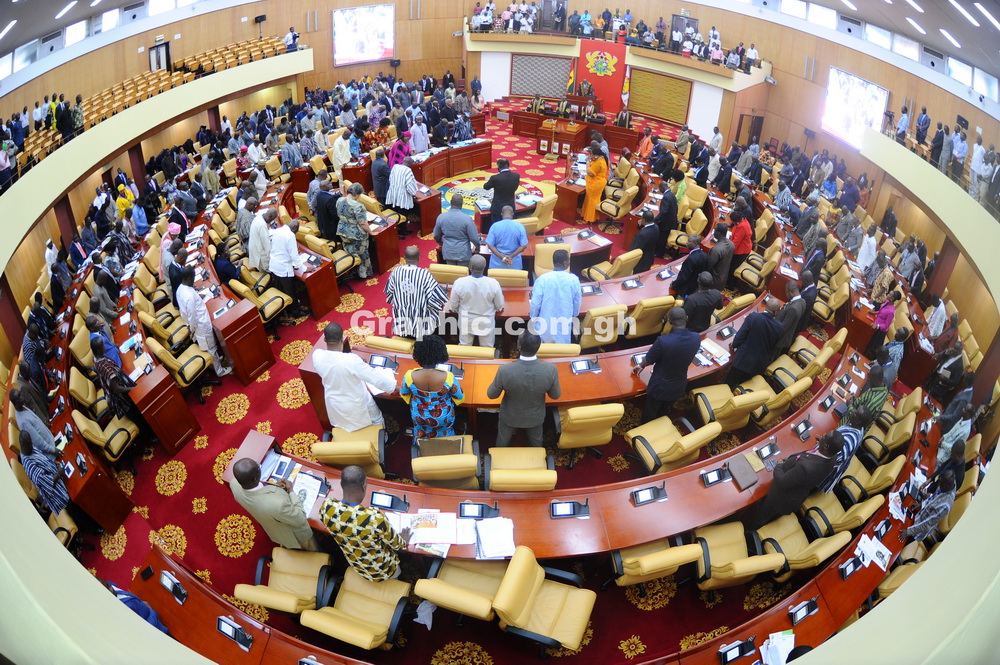Parliament has passed the Valued Added Tax (Amendment) (No. 2) Bill, 2022.
The object of the bill is to amend the Value-Added Tax Act, 2013 (Act 870) to increase the VAT rate by 2.5 per cent from the current rate of 12.5 per cent.
The bill, which will help the government to raise GH¢2.7 billion revenue in 2023, will adjust the VAT threshold and review the transitional provisions for the implementation of the electronic value added tax (e-VAT) system.
It will also revise the administrative penalties for non-compliance in relation to the electronic VAT and remove the VAT on betting, gambling and other games of chance.
The bill was presented and read the first time in Parliament on December 19, 2022 by the Minister of Information on behalf of the Finance Minister.
It was subsequently referred to the Finance Committee, which considered it under a certificate of urgency.
Printed matter no longer exempted
Presenting the committee’s report, the Chairman of the Finance Committee, Kwaku Kwarteng, said in view of the need to raise additional domestic revenue for the development of the country, the committee, by a majority decision, recommended to the House to adopt its report and pass the bill into law.
He said the committee noted that the bill had removed the exemptions for imported textbooks and imported newspapers, architectural plans and similar plans and drawings, scientific and technical works, periodicals, magazines, trade catalogues, price lists, greeting cards, almanacs, calendars, diaries, stationery and other printed matter.
Those materials, he said, were now to be subject to VAT in the normal way.
VAT flat rate scheme threshold
He told the House that the committee noted that unless otherwise directed by the Commissioner-General in writing, a taxable person who was a retailer of goods and who made at the end of any period of 12 months taxable supplies of not less than GH₵200,00 but not exceeding GH₵500,000 was to account for the VAT payable at a flat rate of three per cent calculated on the value of the taxable supply.
“The committee noted that due to the recent general inflationary trends, the minimum threshold of GH₵2,000wo may have become relatively insignificant and therefore urged the Ministry of Finance to consider reviewing the thresholds in the future,” he said.
Inability to reach consensus
Mr Kwarteng informed the House that during the consideration of the bill, the Minority Caucus on the committee, led by the Ranking Member, Dr Cassiel Ato Forson, opposed to the bill because the recent upsurge in inflation had negatively affected the real incomes of people and hence increasing the VAT rate would bring hardship to the people.
“Also, they were of the opinion that the National Health Insurance Levy (NHIL) and the Ghana Education Trust Fund Levy (GETFund Levy) are all valued added taxes and hence increasing the VAT rate would make Ghana the highest VAT rate country on the continent.
“On the other hand, they conceded that failure to pass the bill will leave a fiscal shortfall of about GH¢2.7 billion for 2023 financial year alone,” he said.
Headcount
After the House debated the motion moved by the Finance Minister, Ken Ofori-Atta, for the second reading of the bill, the Second Deputy Speaker, Andrew Asiamah Amoako, put a question on the motion for those in favour to say “Ayes” and those against to say “No”. The Speaker ruled that the “Ayes” had it.
Unhappy with the Speaker’s ruling, the Minority Chief Whip, Mohammed-Mubarak Muntaka, cited Order 113 which bothered on division and challenged the ruling.
He subsequently called for a headcount or division and Mr Amoako ordered the Clerk at Table to conduct the headcount that saw the 136 Majority members voting “Ayes” and 135 Minority MPs voting “No”.
Opposition to bill
Earlier, the Minority Leader, Haruna Iddrisu, said as stated in the committee’s report, the Minority MPs were unable to support the imposition of additional 2.5 per cent VAT which would overburden Ghanaians who were already reeling under excruciating hardship.
He said he did not believe that the population should be made to endure further burden, which would increase the cost of living and doing business in Ghana.
He recalled how in 1995 when the New Patriotic Party, which was then in the Minority, did not see any merit in the introduction of VAT.
“Today, that tax instrument brings in over GH₵15 billion annually to support the running of the Ghanaian economy annually,” he said.
Bad track record
Digging into the past record of the previous government, the Deputy Majority Leader, Alexander Afenyo-Markin, recalled that from 2009 and 2016 that the NDC government was in power, the administration imposed a number of taxes.
He mentioned them as the imposition of one per cent special import levy, 17 per cent on financial services, five per cent on real estate sales, exercise duty on petroleum, 17.5 per cent special petroleum tax, levies on Kayayei on local authorities, taxes on sanitary pad, cutlasses.
“When we came into office in 2017, we abolished these taxes and we took steps to reduce electricity tariffs between 15 per cent to 30 per cent and households benefitted from such reduction,” he said.
With the VAT of 2.5 per cent coming in as a matter necessity, Mr Afenyo-Markin said 80 per cent of the new VAT would be dedicate to the road sector.
